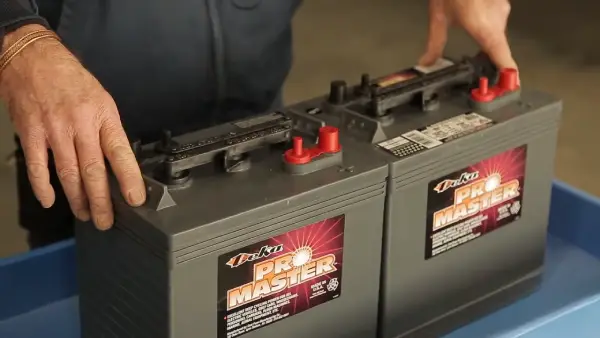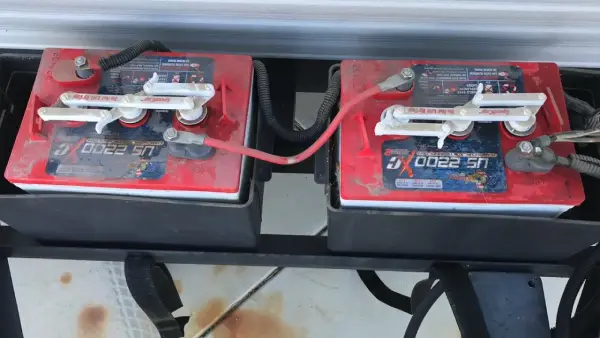Last Updated on July 15, 2024
The power source is crucial for the smooth functioning of your recreational vehicle, so you must select the proper voltage for your battery. One of the most common questions when choosing an RV battery is whether to go for a 6v or a 12v.
Although both have advantages and disadvantages, there are significant differences in AMP hours and battery cells. 12v batteries usually have fewer amp-hours than a 6v battery, but a 12v battery has six cells, whereas a 6v battery has three cells.
Today we’ll discuss everything you need to know about 12v vs 6v RV batteries so that you can make an informed decision before hitting the open road. So buckle up and let’s dive in.
12v vs 6v RV Battery: 6 Differences

6V and 12V batteries have unique advantages, but significant differences can impact your decision. Here are some differences:
Battery Weight
12V batteries are generally heavier than 6V batteries, impacting your RV’s overall weight, balance, and handling. This weight difference is due to the 12V battery’s higher voltage, which requires more cells than a 6V battery to deliver power.
Also, if you opt for a 12V battery with a higher amp-hour capacity, it becomes larger in size, further adding to its weight. As such, if weight is a key consideration for you, a 6V battery might be a better option.
AMP Hours
The Amp Hour (Ah) battery rating measures its total capacity, meaning how long it can supply power. Concerning RV batteries, 6V batteries typically have a significantly larger Ah capacity than 12V batteries. This is because, as mentioned earlier, 6V batteries need fewer cells to meet their voltage requirement.
A typical 12v deep cycle battery will have an amp-hour rating ranging from 75Ah to over 200Ah, while a typical golf cart-style 6v deep cycle battery will be around 200Ah to over 400Ah.
Battery Cells
The number of cells a battery has depends on its voltage. A 12v battery contains six cells, with each cell having 2.1 volts, while a 6v battery contains three cells, with every cell having 2.1 volts. This means that a 12v battery has a total voltage of 12.6 volts, while a 6v battery has a total voltage of 6.3 volts.
As discussed earlier, the primary difference between these two batteries is the voltage requirement. A 6V battery generally has a lower voltage requirement, necessitating fewer cells.
This allows manufacturers to increase the cells’ size and overall capacity, making them the perfect option for applications requiring high-capacity batteries but not necessarily high-voltage.
On the other hand, a 12V battery meets higher voltage needs and hence contains more cells but is better suited for applications that require portable, high-powered batteries.
Battery Connection
Connecting several 12V batteries in parallel is a common practice among RVers to double the amp hours available. This allows for a longer battery life and less worry about running out of power.
Also, wiring 6V batteries in series can double the number of volts, allowing for smaller, lighter batteries without sacrificing power. This can be especially useful for those with limited space or looking to reduce weight on their RV.
Expensiveness
The price of RV batteries varies depending on their type and brand. Six-volt batteries are usually a little more costly compared to 12V batteries.
But this price difference can be offset by the fact that six-volt batteries have a longer lifespan and can handle more discharge cycles than 12V batteries. Therefore, investing in six-volt batteries could be more cost-effective in the long run.
Battery Lifespan
Generally, six-volt batteries have a much longer lifespan than 12V RV batteries because they can handle more discharge cycles, which also means they can provide more power for a more longer time.
Six-volt batteries also have a larger capacity, which translates to less strain on the battery during usage. With proper maintenance, six-volt batteries can last up to 10 years, longer than a typical 12V battery.
RV 12v VS 6v Batteries: Which is Best for Your RV?

When choosing the best RV battery, the decision often boils down to choosing a 12V or a 6V battery. While both options are suitable for powering your RV, distinct differences make one better than the other based on your specific needs.
12V batteries are typically heavier than 6V batteries of the same capacity. So if you are looking for a lightweight power source that is easy to transport or load into your RV, 6V batteries are the way to go. However, if weight is not a major concern, a 12V battery may suit your needs better.
Another aspect to consider is the ampere-hour (Ah) capacity. If you plan to be off the grid for extended periods, 6V batteries with larger Ah capacities may be your best option. But, if you only need the battery for shorter trips and recharging after use is no problem, then a 12V battery may be sufficient.
Lastly, budget is always a consideration. 6V batteries are usually a bit more costly than 12V batteries. Still, if longer battery life and more significant storage capacity are a concern, the extra cost may be worth it for your needs.
So choosing between a 12V and 6V battery for your RV depends mainly on your power needs and travel preferences.
Pros and Cons of RV Batteries: 12-Volt vs 6-Volt
- MAINTENANCE FREE: 12.99x 6.73x 8.43 inches. Weize 12v 100Ah sealed lead acid battery is manufactured…
- OPERATING TEMPERATURE: Charging Temp ranges from 14℉ (-10℃) to 122℉ (50℃), discharging Temp…
- LONGER LIFESPAN: Compared with flooded counterparts, its lower self-discharge of 1-3% per month…
12v and 6v batteries, each with their own pros and cons.
Pros of 12v Batteries:
- More widely available and easier to find
- Typically less expensive than 6v batteries
- Can be used in a wider range of applications
- You can connect several in parallel to double them.
Cons of 12v Batteries:
- Generally have a shorter lifespan than 6v batteries
- May not provide enough power for larger RVs or heavy-duty appliances
- Can be more susceptible to damage from overcharging or undercharging
Pros of 6v Batteries:
- Longer lifespan than 12v batteries
- Provide more power per battery, making them better suited for larger RVs
- Tend to be more durable and resistant to damage from overcharging or undercharging
Cons of 6v Batteries:
- Less widely available and may be harder to find
- More expensive than 12v batteries
- Can only be used in specific applications due to their unique voltage requirements
When Choosing an RV Battery, What Should You Consider?
- 【Maintenance-free & Dimention】Miady 6v 5ah battery can last a long time, which is also a…
- 【Complete Protection】Our 6 volt 5 amp battery can be fully discharged and has stable…
- 【Spill proofVoltage】Rechargeable alarm battery 6v 5ah is maintenance-free & spill proof because…
Several factors must be considered when choosing the right battery for your RV.
- Required Power: The first and most important factor is your RV type and how much power it requires. Larger RVs with more appliances and electronics will require a battery with a higher capacity.
- Size & Weight: Another factor to consider is the size and weight of the battery. 6v batteries are typically larger and heavier than 12v batteries, which can be an issue if you have limited space or weight restrictions.
- Charging System: It’s also important to consider the charging system in your RV. Some systems are designed specifically for 6v batteries, while others work best with 12v batteries. Choosing the right battery for your charging system is important to ensure optimal performance.
- Frequency of Using: Finally, it’s essential to consider how you use your RV. If you frequently boondock or camp off-grid, a high-capacity 6v battery may be the best choice, as it can provide more power for longer periods without recharging.
Maintenance Tips for Your 12v & 6v RV Batteries
Properly maintaining them is crucial for longevity and performance. Here are some tips to keep your 12v or 6v batteries in good condition:
- Regularly check the water levels: Most RV batteries are flooded lead-acid batteries, requiring distilled water to function properly. If necessary, check the water level monthly and top it off with distilled water.
- Keep the battery clean: Dirt and debris can accumulate on the surface of the battery, which can cause corrosion and affect its performance. Clean the battery regularly with baking soda and water to remove any buildup.
- Check the connections: Loose or corroded connections can cause voltage drops and reduce the efficiency of your battery. Inspect the connections regularly and tighten them if necessary.
- Charge your battery properly: Overcharging or undercharging can significantly reduce lifespan. Use a smart charger that automatically adjusts the charge rate based on the state of charge of your battery.
- Store your battery correctly: If you’re not using your RV for an extended period, it’s essential to store your batteries correctly. Keep them in a cool, dry place, fully charged, and disconnected from any power source.
Common Issues May Arise with 12v & 6v RV Batteries
Like any other battery, RV batteries are prone to certain issues that can affect their performance and lifespan.
- One common issue with RV batteries is sulfation. This occurs when lead sulfate crystals build upon the battery’s plates, reducing its capacity and ability to hold a charge. Over time, sulfation can cause permanent damage to the battery, requiring it to be replaced.
- Another common issue is overcharging or undercharging. Both of these scenarios can cause damage to a battery’s cells and reduce its overall lifespan. Overcharging can cause the battery to overheat and boil off electrolyte fluid, while undercharging can result in sulfation.
- Corrosion is another problem that plagues RV batteries. Corrosion typically occurs around the terminals and connectors of the battery and can cause poor electrical connections, leading to reduced performance.
How are the capacity differences between 6V and 12V RV batteries?
In general, 6V batteries tend to have higher capacities than 12V batteries. This is because they are made up of thicker plates. As a result, they are better suited for extended use and are often used in applications where long-lasting power is required.
For example, let’s say you have two batteries with the same total capacity. One is made up of two 6V batteries and the other is made up of one 12V battery. Due to their higher overall capacity, the two 6V batteries will likely provide longer-lasting power than the single 12V battery.
Do 6V or 12V batteries hold more power?

Typically 12V batteries have a higher capacity than 6V batteries, meaning they can hold more power. To understand why this is the case, it’s essential to know a little bit about how batteries work.
Batteries store electrical energy in chemical form, which is converted into electrical current when needed. The voltage of a battery determines how much electrical potential it has, in other words, how much force it can exert on the electrons in a circuit.
A 12V battery has six cells with 2.1 volts each, while a 6V battery has three cells with 2.1 volts each. This means that two 6V batteries wired in series will produce the same voltage as one 12V battery may be your best option.
12v vs 6v batteries for RV: Which is better for extended use?
It’s better to use 12V RV batteries if you use them for a long time. This is because they typically have a higher storing capacity than 6V batteries, so they can store more energy and provide power for longer periods.
For example, a typical 12V deep cycle battery might have a capacity of around 100 amp-hours (Ah). In contrast, a comparable 6V battery might only have a capacity of 220 Ah when wired in series to create a 12V system. This means you would need four 6V batteries to match the capacity of two 12V batteries.
Also, some high-capacity 12V RV batteries are designed for extended use and can last several days or weeks without recharging. These batteries are ideal for boondocking or camping off-grid where there may not be access to electrical hookups.
How often do you need to perform maintenance on your RV batteries?
To ensure that you get the most out of your RV batteries, it is essential to perform regular maintenance. While the frequency of maintenance may vary based on several factors, it is generally recommended to perform preventative maintenance every few years.
But, if you are a full-time RVer, you may need to do maintenance more frequently.
How to extend the life of your RV batteries?
Battery life plays a crucial role in the overall functioning of an RV. Some essential tips are worth considering to extend an RV battery’s lifespan.
- Firstly, charging the battery correctly is crucial to ensure its longevity. Overcharging the battery can cause damage to the plates. At the same time, undercharging can lead to sulfation, which can harm the battery’s internal components.
- Secondly, plugging into mains when possible is an excellent way to extend RV battery life. When you connect to a power outlet, the battery is kept charged, which reduces the risk of sulfation and enhances your battery’s performance.
- Thirdly, disconnecting your battery when not in use is another effective way to extend its life. This way, you can avoid parasitic loads that drain the battery, and it also minimizes the risk of the battery discharging completely.
- Fourthly, limit your inverter use as it significantly degrades battery life. Lastly, use a generator for power-sucking items to keep your battery bank healthy and extend its life.
Get the Best Portable Power by Picking the Perfect RV Battery
Choosing the right RV battery can make all the difference regarding your on-the-go power needs. Whether you opt for a 12v or 6v battery depends on various factors, including your preferences and your RV’s specific requirements.
While both 12v and 6v batteries have advantages and disadvantages, it’s imperative to remember that proper maintenance is key to extending the life of each type of battery. From checking water levels to keeping them clean and dry, taking care of your RV batteries should be a top priority.
Whether you’re an experienced RVer or just starting, understanding battery voltage and the differences between 12v and 6v batteries is crucial. Doing so lets you decide which type of battery best suits your needs.
Last update on 2025-07-08 / Affiliate links / Images from Amazon Product Advertising API





